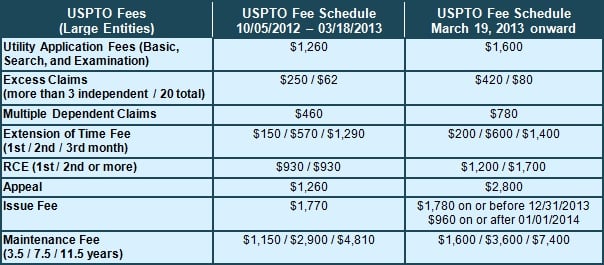The U.S. Patent and Trademark Office (“USPTO”) recently revealed a revised Patent fee schedule which changes the fees for any fee paid on or after March 19, 2013. While this is the first time the USPTO has set its own fees since receiving the authority to do so under the Leahy-Smith America Invents Act, this is the third time since passage of the Act that the fees have increased (previous increases were on September 26, 2011 and October 5, 2012). With certain exceptions, most patent fees during prosecution are increasing. A brief overview of revised fees follows.
Application filing fees
The filing fees for U.S. provisional, non-provisional, design, and U.S. National Stage applications are increasing for applications filed on or after March 19, 2013. While the fee for requesting prioritized examination is decreasing, the USPTO is significantly increasing the fees for independent claims in excess of three and multiple independent claims. In addition, the fees for PCT applications filed with the USPTO are increasing for applications filed on or after January 1, 2014.
Increased fees for extensions of time and request for continued examination
The extension of time and request for continued examination (“RCE”) fees are also increasing effective March 19, 2013. For RCEs, the USPTO has established a system that discourages applicants from filing more than one RCE in an application by significantly increasing the cost for a second or subsequent RCE. The large entity fees are $1,200 for the first RCE and $1,700 for a second or subsequent RCE filed in an application.
Modified fees for Appeals
For the first time, the USPTO is implementing a surcharge for forwarding the appeal brief to the Patent Trials and Appeals Board (“PTAB”) in the event the case is not resolved with the Examiner. While the Notice of Appeal fees are increasing, the USPTO is eliminating the fees for filing an appeal brief. The USPTO estimates that the cost for filing an appeal decreases by approximately 37% if the case is not forwarded to the PTAB. However, the costs for an appeal forwarded to the PTAB increases by approximately 122%.
Increased maintenance fees
The USPTO is increasing the patent maintenance fees due at 3.5 years, 7.5 years, and 11.5 years by approximately 39%, 24%, and 54% respectively.
Modified fees for ex parte reexamination, supplemental examination
After substantially increasing the fees for ex parte reexamination last year, effective March 19, 2013, the USPTO is reducing the fees for ex parte reexamination by almost a third. Supplemental examination fees are also decreasing.
Fees for post-grant proceedings
For both inter partes and post-grant review, the USPTO now requires payment of the following fees:
- A request fee plus excess claim fee for each claim in excess of 20; and
- A post-institution fee once the USPTO orders the review plus an excess claim fee for more than 15
claims being reviewed.
If no excess claim fees are incurred, the USPTO estimates that the fees for inter partes and post-grant review are decreased by approximately 14-15%. The fee for instituting a derivation proceeding remains the same at $400.
Reduced fees effective January 1, 2014
- Reduced fees due at issuance: Effective January 1, 2014, the USPTO is eliminating the publication fee and reducing the issue fee. As such, the fees due at issuance will be approximately 54% less for utility applications and approximately 45% less for design applications.
- Elimination of fee for electronic recordation: For any assignment electronically recorded on or after January 1, 2014, the USPTO is eliminating the assignment recordation fee.
The new fee schedule also provides for a 75% fee discount for small applicants defined as "micro-entities" and a 50% fee discount for small entities. A "micro entity" is a small entity applicant that satisfies certain strict requirements including income and less than four applications filed, or a U.S. institution of higher education.
The following table compares some of the more relevant USPTO fees from October 5, 2012 to March 18, 2013 and from March 19, 2013 forward.

As a result of the decrease in the fees due at issuance and the elimination of the assignment recordation fee, the total USPTO fees payable for prosecution of a basic application, i.e., no excess claim fees, multiple dependent claims, excess page fees or extension fees, up to issuance may actually decrease by about 24%. Because of the reduced fees due at issuance and the elimination of the recordation fees, applicants for pending applications will incur savings as these applications progress to allowance. Nevertheless, applicants may want to consider the impact of these new fees on their pending applications and the renewal fees for issued patents. In certain situations, it may be advantageous to pay applicable fees early before the fees change.
Moreover, the crossover date for the U.S. changing from a first-to-invent patent system to a first-to-file patent system is March 16, 2013. With both the crossover date (March 16, 2013) and fee increase date (March 19, 2013) so close together, applicants may want to consider a strategy for filing new patent applications to account for both changes.
If you have any questions regarding these changes or patent law, do not hesitate to contact our patent prosecution and counseling attorneys.